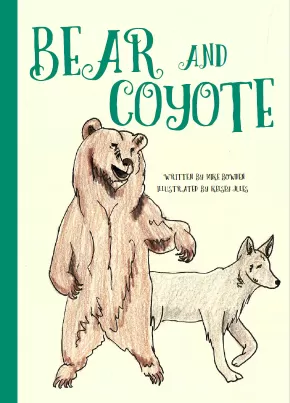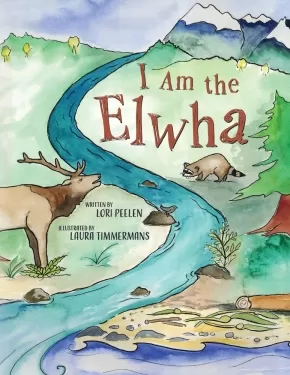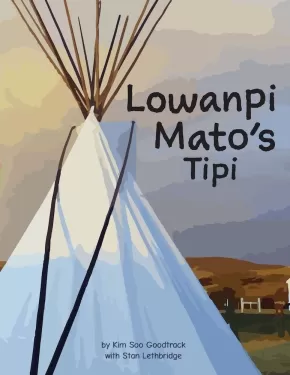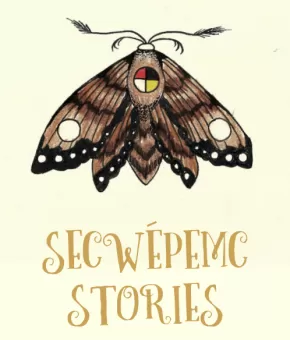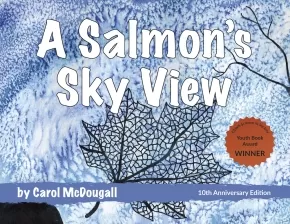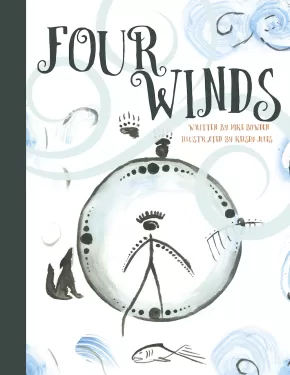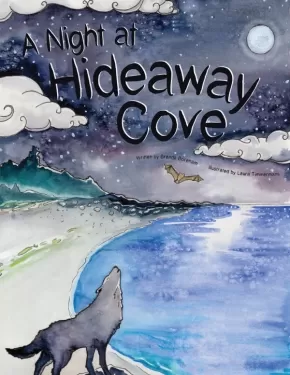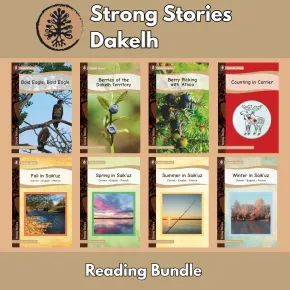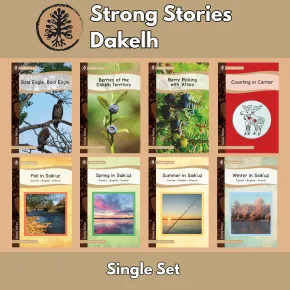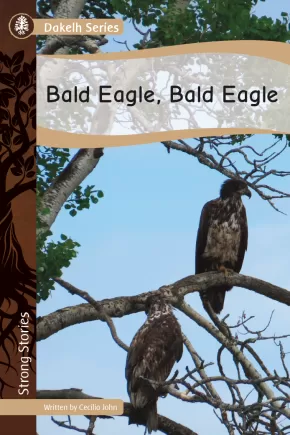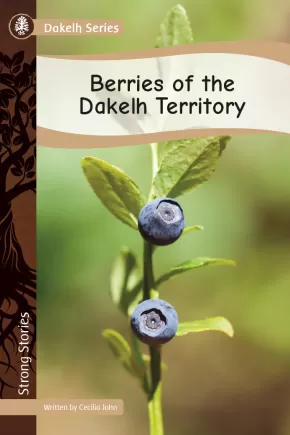
Grade 3
16
-
30
of
84 Results;
Sort By
Go To
of 6
A Spring Adventure With Deer
 $11.95
$11.95

Artists:
Format:
Paperback
ISBN / Barcode: 9781771745659
Synopsis:
Synopsis:
“The buzzing sound fades away when the bee flies off. The fawn twitches his large ears and looks about. He can hear trickling water close by. He walks to the far side of the meadow, down a rocky bank, and to a little creek below.”
This book uses both fiction and non-fiction as a unique approach to storytelling.
On left-hand pages, lyrical text and colourful illustrations tell a story of a young fawn’s early morning spring adventure. Using his senses, the fawn discovers the world around him while searching for his mother. Expertly woven into this delightful story are interesting facts about black-tailed deer and other plants and animals in a forest ecosystem.
Captioned and labelled photographs, word boxes, a diagram, and a map make the non-fiction portion of this book an accessible source of information for young readers.
Educator & Series Information
This book is part of the A Spring Adventure series.
Recommended for grades 2 and 3.
Captioned and labelled photographs, word boxes, a diagram, and a map make the non-fiction portion of this book an accessible source of information for young readers.
Science Connections: Biodiversity, animal classification, food chains, life cycles, ecosystems, geology, and the connections between living and non-living things are some of the concepts included in this book.
Additional Information
24 Pages | 8" x 8" | ISBN: 978-1-77174-565-9 | Paperback
A Spring Adventure With Robins
 $11.95
$11.95

Artists:
Format:
Paperback
ISBN / Barcode: 9781771745666
Synopsis:
Synopsis:
“The fledgling lands in the dry leaves, cones, and twigs on the forest floor. He stops for a moment. He looks around. He is wondering about the little flowers on the kinnikinnick plants. Are they food? He hops up onto a nearby rock to take a closer look.”
This book uses both fiction and non-fiction as a unique approach to storytelling.
On left-hand pages, lyrical text and colourful illustrations tell a story of a young robin’s early morning spring adventure. Using his senses, the fledgling discovers the world around his nest. Expertly woven into this delightful story are interesting facts about robins and other plants and animals in a forest ecosystem.
Captioned and labelled photographs, word boxes, a diagram, and a map make the non-fiction portion of this book an accessible source of information for young readers.
Educator & Series Information
This book is part of the A Spring Adventure series.
Recommended for grades 2 and 3.
Captioned and labelled photographs, word boxes, a diagram, and a map make the non-fiction portion of this book an accessible source of information for young readers.
Science Connections: Biodiversity, animal classification, food chains, life cycles, ecosystems, geology, and the connections between living and non-living things are some of the concepts included in this book.
Additional Information
24 Pages | 8" x 8" | ISBN: 978-1-77174-566-6 | Paperback
Bear and Coyote (PB)
 $11.95
$11.95

Artists:
Format:
Paperback
Text Content Territories:
Indigenous Canadian; First Nations; Salish; Interior Salish; Secwepemc (Shuswap);
ISBN / Barcode: 9781771745703
Synopsis:
Synopsis:
Kenkéknem (Bear) and Sek̓lép (Coyote) are both busy preparing for the long winter months ahead. Kenkéknem eats berries while Sek̓lép dries salmon and bakes Bannock. They have always done this separately and do not want to share with each other. However, this year Kenkéknem is curious about what Sek̓lép is doing, and he is also very hungry. Kenkéknem curiosity and hunger soon get them both in trouble. This forces them to work and learn together to find out how to solve their problem. In the process, they learn through shared experiences and reflect together. They then discover that they have many new stories to share and new ways to prepare food together.
They gather their relations to share their stories in a wider circle of community in order to share this way of learning through connectedness and relationships.
Bear and Coyote tells the creation story of traditional foods and shows the possibilities that arise when we work together. This book makes for a great bedtime story or read-aloud in the classroom.
The back of the book includes recipes for Bannock (Sp̓ íxle7cw) and Saskatoon Berry Jam (Speqpeq7úw̓l).
Bear and Coyote complements other works by Mike Bowden and Kelsey Jules, including Chief Goose and Porcupine, and includes a familiar character from Four Winds.
Educator & Series Information
Recommended for grades 3 to 7.
This book is part of the Secwépemc Stories series.
This story is a great resource to introduce Indigenous languages to young readers. Secwepemctsín is one of 30 distinct Indigenous languages in British Columbia and is in the process of being revitalized after governments and religions developed policies to eliminate the rich language and culture of Indigenous peoples. The book integrates Secwépemc words into the text and includes a pronunciation guide on every page.
This story connects to the BC First Principles of Learning: learning is holistic, reflexive, experiential, and relational; learning involves the consequences of one’s actions; learning is embedded in story; and learning involves patience and time. Learning from Indigenous stories can be different and personal every time a story is read or told, depending on context. This book provides opportunity for those reading to reflect, explore, connect, and learn on a personal interpretative level.
Curriculum links:
- Social emotional learning: cooperation, working together, reciprocal relationships
- Reading and language skills
- Numeracy: includes recipes and encourages young learners to measure and count ingredients
- Food: gathering, preparing, and cooking traditional foods
- Indigenous knowledge and traditions
Additional Information
24 Pages | Colour illustrations | 22 x 28 cm | ISBN: 9781771745703 | Paperback
Chief Goose (PB)
 $11.95
$11.95

Artists:
Format:
Paperback
Text Content Territories:
Indigenous Canadian; First Nations; Salish; Interior Salish; Secwepemc (Shuswap);
ISBN / Barcode: 9781771745697
Synopsis:
Synopsis:
Kúkwpi7 K̓wsucw (Chief Goose) is the leader of the k̓wsucw (geese). As a leader, he relies on doing things the way his people have always done and does not want to change anything. But his people are not prepared for the long winter and Kúkwpi7 K̓wsucw realizes it is time for him to be a true leader. Following ancient protocols, he first consults the great spirit for guidance and wisdom. Then he begins the journey to lead his people in search for a better place to live during the long winter season. Through trial and error, he learns that listening to others and allowing his people to help him lead is the path to the well-being of the k̓wsucw.
Chief Goose tells the story of why geese fly south for the winter and is the perfect bedtime story or read-aloud for classrooms.
This book complements other works by Mike Bowden and Kelsey Jules, including Four Winds, Porcupine, and Bear and Coyote.
Educator Information
Recommended for grades 3 to 7.
This book is part of the Secwépemc Stories series.
This story is a great resource to introduce Indigenous languages to young readers. Secwepemctsín is one of 30 distinct Indigenous languages in British Columbia and is in the process of being revitalized after governments and religions developed policies to eliminate the rich language and culture of Indigenous peoples. The book integrates Secwépemc words into the text and includes a pronunciation guide on every page.
This story connects to the BC First Peoples’ Principles of Learning: learning is holistic, reflexive, experiential, and relational; learning involves the consequences of one’s actions; learning is embedded in story; and learning involves patience and time. Learning from Indigenous stories can be different and personal every time a story is read or told, depending on context. This book provides an opportunity for those reading to reflect, explore, connect, and learn on a personal interpretative level.
Curriculum links:
- Social emotional learning: leadership, listening, social awareness, learning from mistakes and trying again
- Reading and language skills
- Indigenous knowledge and traditions
Additional Information
24 Pages | Colour illustrations | 22 x 28 cm | ISBN: 9781771745697 | Paperback
I Am the Elwha (HC)
 $18.50
$18.50

Artists:
Format:
Hardcover
Text Content Territories:
Indigenous American; Native American; Salish; Coast Salish; Klallam (Clallam); Lower Elwha Klallam Tribe;
ISBN / Barcode: 9781771744744
Synopsis:
Synopsis:
“I am the Elwha, rushing down to the sea. I am the Elwha, wild and free.”
The Elwha River flows 72 kilometres (45 miles) from its source in the Olympic Mountains to the Strait of Juan de Fuca in the Pacific Northwest. Uniquely, it hosts all six salmon species (Pink, Chinook, Coho, Sockeye, Steelhead, and Chum) as well as several species of trout.
In 1911 two dams were built on the river. The dams blocked the migration routes of the salmon and dramatically altered the entire river ecosystem for 100 years. In 2012 the dams were decommissioned and the world’s largest dam removal and habitat restoration project began.
In this lyrical and beautifully illustrated book, the author chronicles the history of the Elwha. Narrated by the powerful voices of plants and animals that inhabit the river ecosystem, the dam builder, a worker, and the river itself, this story celebrates the ongoing rewilding of this special environment and offers a welcome to all of the creatures who are coming home.
To learn more visit: www.elwha.org
Awards
- 2021 Riverby Award for Young Readers
Reviews
“I Am the Elwha is a powerful read about a powerful river and those who value and protect it." – Raina Delisle, Hakai Magazine
Educator Information
At the back of the book are three pages of cultural, scientific, and historical information that discuss the following:
- the importance and symbolism of salmon to the Lower Elwha Klallam Tribe and other Coastal Salish Tribes
- facts about the six species of salmon found in the Elwha River (Chinook, Pink, Chum, Sockeye, Coho, and Steelhead)
- the history of the Elwha River and its status today
Keywords / Subjects: The Elwha River, Rivers, Dams, History, Environmental Awareness, Lower Elwha Klallam Tribe, Coast Salish, Native American, Culture, Washington, Animals, Salmon, First Salmon Ceremony, Plants, Nature, Settlers, Social Responsibility, Environmental Activism, Poetry.
Recommended for grades 3 to 7.
Additional Information
32 Pages | 8.5" x 11" | ISBN: 9781771744744 | Hardcover
Authenticity Note: This lyrical story, which chronicles the history of the Elwha River, is written by Lori Peelen. Robert Elofson, Tribal Elder and Harvest Manager in the Natural Resources Department for the Lower Elwha Klallam Tribes, approved Lori's work and contributed a few pages of back matter at the end of the work. Lori's story was further approved by Frances Charles, the Tribal Councilwoman for the Lower Elwha Klallam Tribe, after the entire council read and approved it.
The Canadian Content label has been applied because the illustrator of this work is Canadian.
Lowanpi Mato’s Tipi
 $18.50
$18.50

Artists:
Format:
Hardcover
Text Content Territories:
Indigenous Canadian; First Nations; Sioux; Lakota;
ISBN / Barcode: 9781771744751
Synopsis:
Synopsis:
“Hokahe! Welcome!”
Welcome to Wood Mountain, home of the Lakota People, in southern Saskatchewan. It is here that we meet Stan Lethbridge, whose ancestral name is Lowanpi Mato (Singing Bear).
Join Lowanpi Mato as he prepares to set up his summer Tipi. He shares with us Lakota life values and traditions, and how they connect to building and taking care of a Tipi. He teaches us that to build a Tipi you need many items; some are from natural sources and others are purchased from a store. Lowanpi Mato takes us through a step-by-step building process so that we can all learn how a Tipi is built.
The Lakota language is woven throughout the story. The Lakota counting chart on pages 30 and 31 invites you to learn to count and have some fun looking back through the book to find items that match each number.
Welcome to Wood Mountain, home of the Lakota People, in southern Saskatchewan. It is here that we meet Stan Lethbridge, whose ancestral name is Lowanpi Mato (Singing Bear).
Join Lowanpi Mato as he prepares to set up his summer Tipi. He shares with us Lakota life values and traditions, and how they connect to building and taking care of a Tipi. He teaches us that to build a Tipi you need many items; some are from natural sources and others are purchased from a store. Lowanpi Mato takes us through a step-by-step building process so that we can all learn how a Tipi is built.
The Lakota language is woven throughout the story. The Lakota counting chart on pages 30 and 31 invites you to learn to count and have some fun looking back through the book to find items that match each number.
Educator Information
Lakota language is woven throughout this story, as are the seven values of Lakota life.
Lakota language is woven throughout this story, as are the seven values of Lakota life.
Includes a counting chart from 1 to 20 in Lakota, as well as a search-and-find counting game.
Additional Information
32 pages | 8.5" x 11" | Hardcover | ISBN: 9781771744751
32 pages | 8.5" x 11" | Hardcover | ISBN: 9781771744751
Porcupine (PB)
 $11.95
$11.95

Artists:
Format:
Paperback
Text Content Territories:
Indigenous Canadian; First Nations; Salish; Interior Salish; Secwepemc (Shuswap);
ISBN / Barcode: 9781771745710
Synopsis:
Synopsis:
Kú7pece (Porcupine) has always struggled with his emotions and pushed his relations away. Kú7pece does not like this part of himself and wants to explore his identity and learn more about himself, his family, and the land.
To connect with his relations and his friends, Kú7pece decides to build a gathering place: a c7ístkten̓ (winter home). This is a place he is hoping his relations can gather and learn about each other through sharing stories. However, Kú7pece traps the sun and soon gets distracted by the sun’s heat and light. So much so, he forgets who he is and his purpose. Soon he is trapped too and cannot see that he is neglecting his responsibilities.
It takes the sacrifice of his relations and friends to help him realize he was trapped in his own reality. Once he realizes the lesson of the sacrifice of his friends – that they were trying to help him reconnect to his own place and purpose – he uses all his courage to turn away from the sun’s heat and light. Slowly, he remembers his identity, purpose, and responsibilities. In the end, Kú7pece finds himself again and reconnects with his relations to gather to tell stories, learn from each other, and support one another.
Porcupine is a story about expressing emotions and being considerate to the needs of others. It works well as a bedtime story or read-aloud for classrooms.
This book works well with others by Mike Bowden and Kelsey Jules, including Four Winds, Bear and Coyote, and Chief Goose.
Educator Information
Recommended for grades 3 to 7.
This book is part of the Secwépemc Stories series.
This story is a great resource to introduce Indigenous languages to young readers. Secwepemctsín is one of 30 distinct Indigenous languages in British Columbia and is in the process of being revitalized after governments and religions developed policies to eliminate the rich language and culture of Indigenous peoples. The book integrates Secwépemc words into the text and includes a pronunciation guide on every page.
This story connects to the BC First Peoples’ Principles of Learning: learning is holistic, reflexive, experiential, and relational; learning involves the consequences of one’s actions; learning is embedded in story; and learning involves patience and time. Learning from Indigenous stories can be different and personal every time a story is read or told, depending on context. This book provides an opportunity for those reading to reflect, explore, connect, and learn on a personal interpretative level.
Curriculum links:
- Social emotional learning: identity, self-awareness, emotions, family, community, relationship skills
- Reading and language skills
- Indigenous knowledge and traditions
Additional Information
24 Pages | Colour illustrations | 22 x 28 cm | ISBN: 9781771745710 | Paperback
Secwépemc Stories Bundle
 $48.92 $54.35
$48.92 $54.35

Text Content Territories:
Indigenous Canadian; First Nations; Salish; Interior Salish; Secwepemc (Shuswap);
ISBN / Barcode: 9781771746632
Synopsis:
Synopsis:
This bundle includes all four Secwépemc stories from Mike Bowden:
- Four Winds (hardcover)
- Porcupine (paperback)
- Bear and Coyote (paperback)
- Chief Goose (paperback)
Secwépemc Stories are the collaborative work of Secwépemc author Mike Bowden and Secwépemc artist Kelsey Jules. These stories convey Secwépemc teachings and embody Indigenous ways of knowing. Mike, a storyteller and educator, strongly believes in story as a way of learning and understanding the world and our relationships within it. Secwépemc language is integrated into the stories and accompanied by pronunciation guides.
These stories connect to the BC First Peoples principles of learning and provide opportunities for those reading to reflect, explore, connect and learn on a personal interpretative level.
Additional Information
Books are 8.5" x 11" | 24 Pages | ISBN 9781771746632
Scroll below to learn more about each book included.
A Salmon's Sky View
 $18.50
$18.50

Artists:
Format:
Hardcover
ISBN / Barcode: 9781771744461
Synopsis:
Synopsis:
The ink and watercolour illustrations in this book reflect the life cycle of a salmon from the salmon’s point of view looking up from underwater. Silhouette images provide a clue to the seasons and to the predators the salmon encounters throughout its life. The story reminds us how the salmon demonstrates great determination and strength in its long journey from the stream where life begins, to the ocean, and back to its natal stream.
Carol ends the story with a step-by-step instructional guide to create your own ink and watercolour image.
Educator Information
This is the 10th anniversary edition from CSWA Science in Society award-winning author/illustrator Carol McDougall, B. Ed., M.A. Carol is an international educator and conservationist with decades of classroom and fine arts teaching experience. She conducts workshops on using the arts to help make learning creative and engaging.
Recommended Grades: K-5.
Additional Information
32 pages | 11" x 8.5" | ISBN: 9781771744461 | Hardcover
Four Winds
 $18.50
$18.50

Artists:
Format:
Hardcover
Text Content Territories:
Indigenous Canadian; First Nations; Salish; Interior Salish; Secwepemc (Shuswap);
ISBN / Barcode: 9781771744478
Synopsis:
Synopsis:
A curious Qelmúcw (Person) from the Secwépemc Nation is learning about the world around him with the help of some of his relations. Sk̓elep (Coyote) and Tree guide Qelmúcw in understanding Cmesekst te Snewt (The Four Winds).
Qelmúcw experiences the power of a learning journey using perseverance and courage. He discovers that for meaningful learning to happen he needs to find balance or he could be blown off his learning journey, or even worse, not be completely open to his learning.
This story reflects the reciprocal learning and understanding relationship between a human being and all life and elements (all of relations). It models and reflects the importance of First Peoples’ Principles of Learning: learning is holistic, reflexive, experiential, and relational; learning involves the consequences of one’s actions; learning is embedded in story; and learning involves patience and time. Learning from Indigenous stories can be different and personal every time a story is read or told, depending on context.
Four Winds is the perfect bedtime story or read-aloud in the classroom.
This book works well alongside other books by Mike Bowden and Kelsey Jules, including Chief Goose and Porcupine, and includes a familiar character from Bear and Coyote.
Educator Information
Recommended for grades 3 to 7.
Recommended for grades 3 to 7.
This book is part of the Secwépemc Stories series.
This story is a great resource to introduce Indigenous languages to young readers. Secwepemctsín is one of 30 distinct Indigenous languages in British Columbia and is in the process of being revitalized after governments and religions developed policies to eliminate the rich language and culture of Indigenous peoples. The book integrates Secwépemc words into the text and includes a pronunciation guide on every page. The back of the book includes language resources and a link to an audio pronunciation guide for the Secwépemc alphabet.
This story connects to the BC First Peoples’ Principles of Learning and provides an opportunity for those reading to reflect, explore, connect, and learn on a personal interpretative level.
Curriculum links:
- Social emotional learning: community, helping others, critical thinking, learning from mistakes and trying again
- Reading and language skills
- Indigenous knowledge and traditions
Additional Information
32 Pages | 8.5 " x 11" | ISBN: 9781771744478 | Hardcover
32 Pages | 8.5 " x 11" | ISBN: 9781771744478 | Hardcover
A Night at Hideaway Cove (PB)
 $14.50
$14.50

Artists:
Format:
Paperback
ISBN / Barcode: 9781771743303
Synopsis:
Synopsis:
Come with us, on a mid-August night, to a secluded beach on the Pacific Northwest Coast. There we will meet many creatures that make Hideaway Cove their home. From the black bear to the tiniest beach hopper, we will catch a glimpse of their night-time activities. We will also learn how the moon affects the tides, and explore the intertidal zones.
A Night at Hideaway Cove is a sequel to Hideaway Cove, another exploration of the Pacific Northwest Coast during the daytime. Written by Brenda Boreham, and illustrated by Laura Timmermans, both books share with us the many interconnections within a healthy marine ecosystem.
A Night at Hideaway Cove is a sequel to Hideaway Cove, another exploration of the Pacific Northwest Coast during the daytime. Written by Brenda Boreham, and illustrated by Laura Timmermans, both books share with us the many interconnections within a healthy marine ecosystem.
Reviews
"There are many thoughtful and charming details in both the text and illustrations, such as the moon’s movement across the sky in Laura’s illustrations and the subtle introduction of numbers as the narrative progresses. The moon is a large focus of the story—children will learn about how it affects the tides and what this means for beach creatures like raccoons, who are able to forage for an easy meal amongst the heaps of seaweed left along the shoreline as the tide goes out…. A Night at Hideaway Cove is sure to both delight and inform young readers." – Canadian Teacher Magazine, Winter 2019 issue
"There are many thoughtful and charming details in both the text and illustrations, such as the moon’s movement across the sky in Laura’s illustrations and the subtle introduction of numbers as the narrative progresses. The moon is a large focus of the story—children will learn about how it affects the tides and what this means for beach creatures like raccoons, who are able to forage for an easy meal amongst the heaps of seaweed left along the shoreline as the tide goes out…. A Night at Hideaway Cove is sure to both delight and inform young readers." – Canadian Teacher Magazine, Winter 2019 issue
Educator & Series Information
Each book in the By Day and By Night Nature Series focuses on a scene typical of a distinct west coast habitat, showing how living and non-living things are connected in a healthy ecosystem. As readers, we observe animals going about their daily activities: caring for their young, searching for food, and responding to the changes in light, temperature, and weather conditions throughout the day or night. The last four pages of each book provide facts about the highlighted animals and plants as well as features that are unique to their habitats. The final page suggests ways that young readers and their families can be respectful as they visit wilderness areas.
Readers with a sense of curiosity will find opportunities in these books to:
- use picture clues to predict the featured animal on the next page
- identify, count, and sequence numbers (1 owl, 2 deer, 3 squirrels, etc.)
- search for small creatures that travel from page to page
- discover patterns in the text and structure of the books
- track the movement of the sun, or moon, across the sky
Curriculum Links
Reading - Providing opportunities for guided practise in using reading strategies: visualizing, making connections, asking questions, transforming, and inferring.
Science - Supporting discussion and further exploration:
- characteristics of living things
- needs of living things
- connections between living and non-living things
- daily and seasonal changes
- animal growth and changes
- plant growth and changes
- weather
- habitats
- observable patterns in the sky
Numeracy - Counting and sequencing of numbers 1 to 10.
Social Responsibility - Initiating discussions about ways to take care of wilderness areas.
Search for a mouse that travels from page to page in this story!
Creative Nonfiction: A fictional story with factual information about the Pacific Northwest Coast, as well backmatter that delivers scientific information about the moon, intertidal zones, and seashore creatures.
Additional Information
32 pages | ISBN: 9781771743303 | Paperback
32 pages | ISBN: 9781771743303 | Paperback
Strong Stories Dakelh - Reading Bundle
 $429.84 $477.60
$429.84 $477.60

Text Content Territories:
Indigenous Canadian; First Nations; Dene; Dakelh (Carrier);
ISBN / Barcode: 9781771746687
Synopsis:
Synopsis:
Bundle includes all 8 titles, 6 of each, in the Strong Stories Dakelh series (48 books total).
These books are recommended for primary students.
Books in the Dakelh series include the following from author and illustrator Cecilia John:
Bald Eagle, Bald Eagle
Berries of the Dakelh Territory
Berry Picking with ‘Atsoo
Counting in Carrier (delivered in a dual-language format of Carrier and English)
Fall in Saik’uz (delivered in a triple-language format of Carrier, English, and French)
Spring in Saik’uz (delivered in a triple-language format of Carrier, English, and French)
Summer in Saik’uz (delivered in a triple-language format of Carrier, English, and French)
Winter in Saik’uz (delivered in a triple-language format of Carrier, English, and French)
For the books containing Carrier, downloadable pronunciation guides are available:
Spring in Saik'uz Pronunciation Guide
Summer in Saik'uz Pronunciation Guide
Fall in Saik'uz Pronunciation Guide
Winter in Saik'uz Pronunciation Guide
Berries of the Dakelh Territory Pronunciation Guide
Counting in Carrier Pronunciation Guide
Additional Information
ISBN: 9781771746687
Strong Stories Dakelh - Single Set Bundle
 $71.64 $79.60
$71.64 $79.60

Text Content Territories:
Indigenous Canadian; First Nations; Dene; Dakelh (Carrier);
ISBN / Barcode: 9781771745765
Synopsis:
Synopsis:
Own the entire set of Dakelh Strong Stories! (8 books total)
Recommended for primary students.
Books in the Dakelh series include the following from author and illustrator Cecilia John:
Bald Eagle, Bald Eagle
Berries of the Dakelh Territory
Berry Picking with ‘Atsoo
Counting in Carrier (delivered in a dual-language format of Carrier and English)
Fall in Saik’uz (delivered in a triple-language format of Carrier, English, and French)
Spring in Saik’uz (delivered in a triple-language format of Carrier, English, and French)
Summer in Saik’uz (delivered in a triple-language format of Carrier, English, and French)
Winter in Saik’uz (delivered in a triple-language format of Carrier, English, and French)
For the books containing Carrier, downloadable pronunciation guides are available:
Spring in Saik'uz Pronunciation Guide
Summer in Saik'uz Pronunciation Guide
Fall in Saik'uz Pronunciation Guide
Winter in Saik'uz Pronunciation Guide
Berries of the Dakelh Territory Pronunciation Guide
Counting in Carrier Pronunciation Guide
Additional Information
ISBN: 9781771745765
Strong Stories Dakelh: Bald Eagle, Bald Eagle
 $9.95
$9.95

Format:
Paperback
Text Content Territories:
Indigenous Canadian; First Nations; Dene; Dakelh (Carrier);
ISBN / Barcode: 9781771743228
Synopsis:
Synopsis:
There are many animals that live within the Dakelh Territory. Follow along with this playful poem as the animals spot each other. What kinds of animals have you spotted in your area?
Educator & Series Information
Recommended for primary students (grades 1-3).
Bald Eagle, Bald Eagle is part of the Strong Stories: Dakelh series. Strong Stories focus on different First Nation territories from across Canada and the United States. These stories reflect the belief that our stories are the roots of our people, our lands and our cultures. It is from our stories that we grow and become strong and proud.
Additional Information
16 pages | 6.00" x 9.00" | ISBN: 9781771743228
Strong Stories Dakelh: Berries of the Dakelh Territory
 $9.95
$9.95

Format:
Paperback
Text Content Territories:
Indigenous Canadian; First Nations; Dene; Dakelh (Carrier);
ISBN / Barcode: 9781771743235
Synopsis:
Synopsis:
Wild berries grow almost everywhere. Some wild berries are good to eat while others will make you sick. It is important to know if a berry is safe to eat before you pop it into your mouth! What kinds of berries have you eaten?
Educator Information
Recommended for primary students (grades 1-3).
Download a pronunciation guide for the Carrier words in the story: Berries of the Dakelh Territory Pronunciation Guide
Berries of the Dakelh Territory is part of the Strong Stories: Dakelh series. Strong Stories focus on different First Nation territories from across Canada and the United States. These stories reflect the belief that our stories are the roots of our people, our lands and our cultures. It is from our stories that we grow and become strong and proud.
Additional Information
16 pages | 6.00" x 9.00" | ISBN: 9781771743235
Sort By
Go To
of 6




